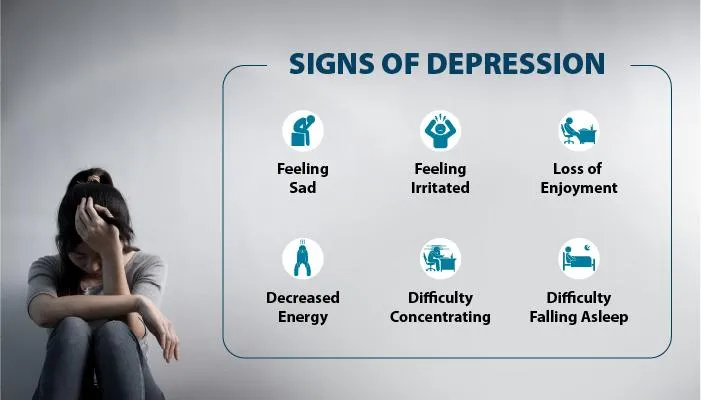
When Sadness Becomes Depression: Knowing the Signs
At Cordial Psychiatry, we understand the delicate line between normal sadness and clinical depression. Everyone experiences emotional lows, especially after setbacks, disappointments, or personal loss. However, when these feelings persist and start to interfere with daily life, they may signify something deeper—depression. Knowing the difference can be life-changing. Below is a comprehensive guide to help recognize the signs of depression, understand its impact, and explore effective treatment options.
Understanding the Difference Between Sadness and Depression
Sadness is a human emotion—temporary and often triggered by specific events. It fades with time or with positive changes in circumstances. Depression, on the other hand, is a mental health disorder with persistent symptoms that linger for weeks, months, or even years.
Key Differences:
-
Duration: Sadness passes; depression persists.
-
Severity: Sadness might affect your mood; depression affects your thoughts, behavior, and physical health.
-
Functionality: With sadness, you can still function; depression often impairs daily functioning.
Early Warning Signs of Depression
Recognizing early signs of depression is critical to early intervention. Common indicators include:
Persistent Low Mood
A person feels an overwhelming sense of despair or emptiness, often without a clear reason.
Loss of Interest in Activities
Things that once brought joy—hobbies, relationships, work—suddenly feel meaningless or exhausting.
Changes in Sleep Patterns
Insomnia or excessive sleeping can both be warning signs. Disrupted sleep often exacerbates depressive symptoms.
Appetite and Weight Fluctuations
Sudden weight loss or gain without intent may indicate emotional distress.
Fatigue and Lack of Energy
Even minor tasks may feel overwhelming. The person may complain of constant tiredness or mental fog.
Difficulty Concentrating
Decision-making becomes harder. Concentration and memory issues are common.
Feelings of Worthlessness or Guilt
Intense self-criticism, guilt over minor issues, or feeling like a burden to others is common in depression.
Thoughts of Death or Suicide
Suicidal ideation, even if passive, is a critical sign and requires immediate professional help.
Types of Depression
Depression can take many forms, including:
Major Depressive Disorder (MDD)
Characterized by severe symptoms that interfere with work, sleep, study, and relationships.
Persistent Depressive Disorder (Dysthymia)
A chronic form of depression lasting two years or more. Symptoms are milder but long-lasting.
Bipolar Depression
Involves episodes of extreme highs (mania) and lows (depression).
Seasonal Affective Disorder (SAD)
Depression related to changes in seasons, often beginning in fall and improving in spring.
Postpartum Depression
Affects new mothers and is often triggered by hormonal shifts, emotional stress, and the demands of caring for a newborn.
What Causes Depression?
Depression is multi-faceted and may stem from:
-
Biological factors: Chemical imbalances in the brain, genetics.
-
Psychological factors: Low self-esteem, chronic stress, unresolved trauma.
-
Environmental triggers: Abuse, neglect, major life transitions, or loss.
No single cause exists; depression often results from a combination of these elements.
The Physical Effects of Depression
Depression doesn’t only affect the mind. It also affects the body:
-
Chronic pain (e.g., headaches, backaches)
-
Digestive problems
-
Lowered immune function
-
Hormonal imbalances
When left untreated, depression increases the risk of developing other serious medical conditions.
]How Depression Affects Daily Life
Depression infiltrates every aspect of a person’s life, including:
-
Work: Decreased productivity, frequent absences, or job loss.
-
Relationships: Isolation, misunderstandings, or conflict with loved ones.
-
Self-Care: Neglecting hygiene, health appointments, or medication routines.
Diagnosing Depression at Cordial Psychiatry
At Cordial Psychiatry, we use a structured and compassionate approach:
Comprehensive Evaluation
We begin with a detailed assessment of symptoms, personal history, and family history of mental illness.
Diagnostic Tools
We use standardized diagnostic tools (such as the PHQ-9) to assess the severity of symptoms.
Collaborative Treatment Planning
Our mental health professionals work closely with patients to develop individualized care plans.
Treatment Options for Depression
1. Psychotherapy
Cognitive Behavioral Therapy (CBT) and Interpersonal Therapy (IPT) are highly effective in addressing negative thought patterns and improving interpersonal skills.
2. Medication
Antidepressants may be recommended based on symptom severity. We closely monitor progress and side effects.
3. Lifestyle Modifications
Exercise, nutrition, and sleep hygiene play supportive roles in depression recovery.
4. Support Groups
Sharing experiences in a structured setting can foster healing and reduce isolation.
5. Brain Stimulation Therapies
In treatment-resistant cases, we may consider Transcranial Magnetic Stimulation (TMS) or Electroconvulsive Therapy (ECT).
The Role of Support Systems
A strong support system can significantly influence recovery. Family, friends, therapists, and community support groups offer encouragement, accountability, and a sense of belonging.
When to Seek Help
If symptoms:
-
Persist for more than two weeks,
-
Begin to interfere with daily functioning,
-
Include suicidal thoughts,
…it’s time to seek professional help.
At Cordial Psychiatry, we are committed to providing compassionate and evidence-based care tailored to your needs.
FAQs About Depression
How do I know if my sadness is turning into depression?
If your sadness persists for more than two weeks, affects your daily life, and includes symptoms like fatigue, loss of interest, or thoughts of self-harm, it may be depression.
Can depression go away on its own?
Mild cases might resolve with lifestyle changes, but clinical depression typically requires professional intervention.
Is depression treatable?
Yes. With the right combination of therapy, medication, and lifestyle changes, most people recover or experience significant improvement.
Is medication always necessary for depression?
Not always. Some individuals improve with therapy and lifestyle modifications alone. However, moderate to severe depression may require medication.
Can children and teens suffer from depression?
Yes. Depression affects people of all ages. In younger populations, it may manifest as irritability, academic issues, or social withdrawal.
How do I talk to someone I think is depressed?
Approach with empathy. Avoid judgment or advice-giving. Instead, listen and encourage them to seek professional help.
Take the First Step Toward Healing
If you or someone you love is showing signs of depression, don’t wait. Reach out to our team at Cordial Psychiatry. We offer a safe space to explore your feelings and begin your journey toward healing.

